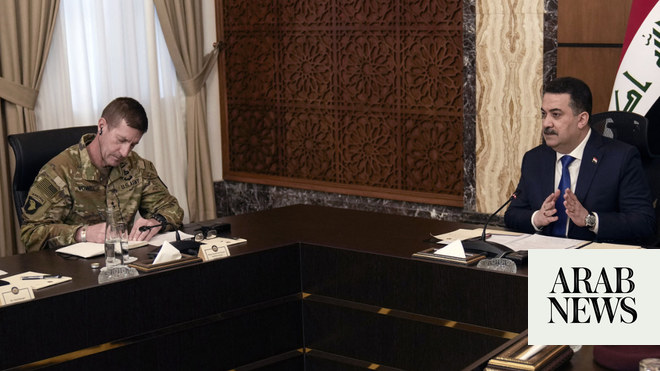
GCC participation in negotiations crucial to prevent Tehran making ‘Persian bomb,’ analyst tells Arab News
Diplomats had said earlier on Friday that officials from Tehran and Washington would travel to Vienna next week as part of efforts to revive the 2015 accord
RIYADH: Major world powers and Tehran on Friday eyed potential progress toward securing Washington"s return to the 2015 Joint Comprehensive Plan of Action, otherwise known as the Iran nuclear deal. The powers agreed to hold fresh talks next week which involves shuttle diplomacy with US officials.
China, France, Germany, Russia and Britain are among the participants in the deal, which concerns Tehran"s nuclear ambitions. Their officials would meet in person on Tuesday in Vienna, according to an EU spokesman after a video conference.
The US will not take part directly in the main negotiations because former President Donald Trump withdrew from the deal in 2018. The EU, however, said its mediator in the Austrian capital would have “separate contacts” with officials from Washington.
A European diplomatic source said: “Iran and the US will be in the same town, but not in the same room.”
Iranian Foreign Minister Javad Zarif insisted the aim of the talks was to “rapidly finalize sanctions-lifting and nuclear measures for the choreographed removal of all sanctions, followed by Iran"s ceasing remedial measures.”
“No Iran-US meeting. Unnecessary,” he wrote on Twitter.
US State Department spokesman Ned Price called the Vienna talks a “healthy step forward” and said that Washington “remains open” to a direct meeting with Tehran.
He cautioned nonetheless, “These remain early days, and we do not anticipate an immediate breakthrough as there will be difficult discussions ahead.”
Iran’s way of exploiting delays would bring nothing but more wars and unrest for the region and the world.
Dr. Hadi bin Ayedh, Kuwaiti analyst
EU diplomat Enrique Mora, who chaired the talks, described Friday"s virtual meeting as “positive,” but warned there was much left to do in order to revive the deal.
“Substantial work ahead for a key opportunity to bring JCPOA back to life,” he tweeted.
A senior EU official said Brussels, which acts as coordinator, hoped to see a final agreement on a US return to the deal within the next two months.
The official said two groups of experts from the remaining participating countries would work simultaneously, with one focused on US sanctions and the other on rolling back Iran"s breaches.
In the Middle East, experts called for the participation of Gulf states in the talks because they are the ones in the direct line of fire of the Iranian regime, its hydra-headed militias, and its huge arsenal of missiles and armed drones.
Dr. Hadi bin Ayedh of Kuwait"s Ministry of Information stressed that Arab countries, specifically the GCC, should participate in the ongoing negotiations about the nuclear agreement with Iran.
He described their participation as instrumental for the region in light of existing tensions and Iranian interference in various Arab countries.
Bin Ayedh noted that Iran’s way of exploiting delays would bring nothing but more wars and unrest for the region and the world.
The absence of GCC countries from the previous agreement had given Iran a chance to flagrantly interfere in Yemen, Syria, and other countries, he said.
Such matters, along with the participation of the US, should be part of the next negotiations with Iran and should form a part of the agreement between Iran and other countries, Bin Ayedh said.
2e222“The Iranian nuclear program causes the most harm in Gulf countries because some of Iran’s nuclear installations are closer to Gulf countries than to Iranian cities. Thus this poses a number of threats and dangers, especially if there is a leak in a nuclear reactor,” he said.
In addition, close proximity poses a huge threat to public health in GCC countries. Therefore, GCC countries should participate and “demand international guarantees if such concerns materialize on the ground,” he said.
Bin Ayedh, who is an international relations researcher, said GCC countries did not participate or were not given a chance to do so in the negotiations.
“Today, the GCC countries should do their best to be part of the negotiations in order to protect their interests in the same way Iran tries to protect Tehran"s interests,” he said.
Bin Ayedh noted that Iran exploits uranium enrichment to threaten both Arab countries as well as regional security.
“The whole world saw how Iraq was destroyed and reduced to chaos when Iran took over and Arab countries were absent from agreements and negotiations concerning Iraq"s future. That absence allowed Iran to take the upper hand,” he said.
“This is a lesson that GCC countries should learn from and make sure they do not let Iran take advantage of the situation in the future.”
Waheed Hashim, a professor of political sciences at King Abdul Aziz University in Jeddah, said Iran procrastinates and uses devious methods to win time and push for a certain status quo that they want to prevail in the region and the world.
He called upon the superpowers to consider these facts and prevent Iranians from manufacturing the “Persian bomb.”
He added that Iran refused GCC participation for reasons that are mainly rooted in Tehran’s hatred toward GCC countries, specifically Saudi Arabia.
In 2018, then US president Trump dramatically withdrew from the pact and imposed crippling economic sanctions on Tehran. The following year, Iran announced it would start breaking the limits of agreed-upon nuclear activity.
The remaining participants in the deal have scrambled in recent years to salvage it from total collapse as Tehran has made good on its threats.
(with input from AFP, Reuters)











